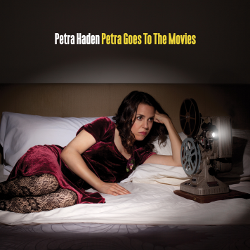KHSU Music Director Mark Shikuma’s occasional column about new records.
###
Petra Goes to the Movies, Petra Haden (Anti-)

Eclectic composer, arranger, violinist/instrumentalist and gifted vocalist Petra Haden has carved a musical path that is in a league of its own. In contrast to the growing number of singular artists who have used a multitude of instruments, effects and vocals, Haden, the daughter of the legendary jazz bassist Charlie Haden, intricately employs layers of her own voice to interpret instruments and vocals.
The variation from replication is what Haden’s work so engaging and enjoyable. In 2005, Haden drew considerable critical attention for her 2005 Petra Haden Sings: The Who Sell Out, a faithful a cappella re-imagining of The Who’s ’67 eccentric album (on a dare from friend, former Minutemen bassist Mike Watt) made entirely on a 8-track Tascam recorder. Haden focuses on the music of film – scores and original songs – her astounding new tribute Petra Goes to the Movies.
As in the opening track, the opening theme from Nicholas Ray’s 1955 classic, Rebel Without A Cause, composed by Leonard Rosenman, Haden points to the overall tone of a film is key in its opening music. With Rosenman’s relatively brief piece, the work is full of arcs and sweeping mood changes, and Haden brilliantly captures the original score’s subtly and flow.
Two pieces are by U.S. film composing legend Bernard Hermann. Haden’s interpretation of the opening theme to Martin Scorsese’s Taxi Driver (“God’s Lonely Man”) retains Hermann’s dark, lurking tones, originally created by a moody collision of strings, horns and percussion, by constructing a complex arrangement of vocals. Haden’s insight and execution often blurs lines that separate “voice” or “singing” and “instruments,” making her work so inventive.
Haden’s homage extends to two iconic Italian film composers: Nino Rota, who is best known for his scores of numerous Fellini classics (and Coppola’s Godfather), and Ennio Morricone, whose scores for Sergio Leone’s Spaghetti Westerns have influenced a multitude of contemporary music genres. Haden picks the playful and surreal “Carlotta’s Gallop” from Fellini’s masterwork, 8 ½, including a superb re-imagining of the original’s blaring, oddball organ parts, while Morricone’s now familiar theme to A Fistful of Dollars takes an equally playful turn, as in her humorous trumpet renditions, while the traditional string arrangements, in juxtaposition, are replaced with breath-filled tones, adding a ghostly quality.
Haden also selects four more traditionally arranged songs, showcasing her vocal range as well as inserting sincere emotion into her interpretations, with satisfying results. For the well-known Goldfinger theme, co-written by film composing veteran John Barry and Latin jazz figure Perez Prado, Haden chooses to take a more relaxed, even sulty, delivery, akin to Eartha Kitt, in contrast to the operatic Shirley Bassey original. Taking a more understated route for the lead vocal line also serves as clever way to draw attention to Barry’s dramatic orchestration. For her rendition of Pat Matheny, Lyle Mays and David Bowie’s “This Is Not America” (from John Schlesinger’s ’85 film The Falcon and The Snowman), Haden is joined by her father and guitarist Bill Frisell, whom she collaborated with on a 2003 self-titled full-length recording, for a melancholic version, lending an ominous close to Goes To The Movies.
By taking the film music from its previous visual context, Petra Haden successfully reveals the ingenuity of the original’s score and how succinctly emotion, tone and drama are conveyed in the space of a conventional pop song. With the assistance of engineer Justin Burnett, Goes To The Movies succeeds as both a loving and reverent tribute to some of her favorite pieces and composers of modern cinema, while achieving this with a dazzling, and occasionally dizzying, execution.
CLICK TO MANAGE